| Listing 1 - 10 of 93 | << page >> |
Sort by
|
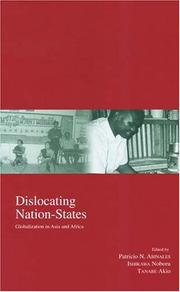
ISBN: 1920901078 Year: 2005 Publisher: Melbourne : TransPacific,
Abstract | Keywords | Export | Availability | Bookmark
 Loading...
Loading...Choose an application
- Reference Manager
- EndNote
- RefWorks (Direct export to RefWorks)
Nation-state. --- Nation
Book
ISBN: 3830510039 Year: 2005 Publisher: Berlin : BWV, Berliner Wissenschafts-Verlag,
Abstract | Keywords | Export | Availability | Bookmark
 Loading...
Loading...Choose an application
- Reference Manager
- EndNote
- RefWorks (Direct export to RefWorks)
Book
ISBN: 3631535104 9783631535103 Year: 2005 Volume: 514 Publisher: Frankfurt am Main : P. Lang,
Abstract | Keywords | Export | Availability | Bookmark
 Loading...
Loading...Choose an application
- Reference Manager
- EndNote
- RefWorks (Direct export to RefWorks)
Nation-building --- Nation-building --- Reconstruction d'une nation --- Reconstruction d'une nation
Book
ISBN: 4753102424 9784753102426 Year: 2005 Publisher: Tōkyō : Ibunsha,
Abstract | Keywords | Export | Availability | Bookmark
 Loading...
Loading...Choose an application
- Reference Manager
- EndNote
- RefWorks (Direct export to RefWorks)
Nation-state. --- Nation. --- Political violence. --- Violence politique. --- État.
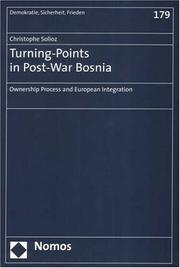
ISBN: 3832916660 Year: 2005 Publisher: Baden-Baden : Nomos,
Abstract | Keywords | Export | Availability | Bookmark
 Loading...
Loading...Choose an application
- Reference Manager
- EndNote
- RefWorks (Direct export to RefWorks)
Book
ISBN: 9780822386650 Year: 2005 Publisher: Durham, N.C. : Duke University Press,
Abstract | Keywords | Export | Availability | Bookmark
 Loading...
Loading...Choose an application
- Reference Manager
- EndNote
- RefWorks (Direct export to RefWorks)
An interdisciplinary collection of essays designed to map out a wide-ranging and productive future for postcolonial studies, this volume assesses the current state of the field and points toward its most promising new developments. In addressing questions about the definition and relevance of postcolonial scholarship, many of the essays consider its relation to the study of globalization. While some contributors offer broad reflections on the existing two-way influence between postcolonial theory and established university disciplines such as literary criticism and history, others forge ahead into some vital, if nascent, areas for postcolonial research such as media studies, environmental studies, religious studies, and linguistic and semantic analysis. The contributors represent many of the fields altered by postcolonial studies over the past two decades, including literary studies, history, anthropology, Asian and African studies, and political science. They model diverse applications of postcolonial theory to Latin America, East Asia, the Middle East, and the United States. Postcolonial Studies and Beyond propels the field forward. It showcases scholars coming from intellectual precincts usually considered outside the purview of the postcolonial finding new ways to deploy classic techniques of postcolonial analysis, and scholars strongly associated with postcolonial studies offering substantial critiques designed to challenge the field’s most fundamental assumptions.--
Postcolonialism --- Globalization --- Nation-state --- Liberalism
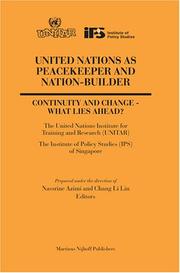
ISBN: 9789047417149 9789004148260 Year: 2005 Publisher: Leiden; Boston : Brill | Nijhoff
Abstract | Keywords | Export | Availability | Bookmark
 Loading...
Loading...Choose an application
- Reference Manager
- EndNote
- RefWorks (Direct export to RefWorks)
In the wake of the Iraq War, what lies ahead for the United Nations as peacekeeper and nation-builder? What lessons were learnt in Afghanistan and Iraq, what reforms could they entail, how do UN efforts fare as compared with those of the United States, and what will be, in the next decade, the most pressing challenges confronting the Organization? Will the United Nations, in its current form and within the new global power structure, be able to remain relevant, retain its ideals and still respond meaningfully to mounting international tensions? These were some of the questions tackled by a group of eminent scholars and practitioners, many directly and personally involved with multilateral or unilateral peace operations. In addition to the larger issues of peacekeeping and peace-building and the recommendations for historical reform suggested by the 'UN High-level Panel on Threats, Challenges and Change' in December 2004, the group debated some of the most complex recent interventions, including Afghanistan, East Timor and Iraq. This volume, which contains all the presentations and discussions of the UNITAR/IPS Conference on "United Nations as a Peacekeeper and Nation-Builder: Continuity and Change - What Lies Ahead?" will be a valuable addition to the collections of experts or laypersons interested in the future role of the United Nations in general and in peacekeeping and post-conflict state-building in particular.
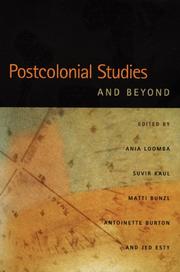
ISBN: 9780822335238 0822335239 Year: 2005 Publisher: Durham ; London : Duke University Press,
Abstract | Keywords | Export | Availability | Bookmark
 Loading...
Loading...Choose an application
- Reference Manager
- EndNote
- RefWorks (Direct export to RefWorks)
An interdisciplinary collection of essays designed to map out a wide-ranging and productive future for postcolonial studies, this volume assesses the current state of the field and points toward its most promising new developments. In addressing questions about the definition and relevance of postcolonial scholarship, many of the essays consider its relation to the study of globalization. While some contributors offer broad reflections on the existing two-way influence between postcolonial theory and established university disciplines such as literary criticism and history, others forge ahead into some vital, if nascent, areas for postcolonial research such as media studies, environmental studies, religious studies, and linguistic and semantic analysis.The contributors represent many of the fields altered by postcolonial studies over the past two decades, including literary studies, history, anthropology, Asian and African studies, and political science. They model diverse applications of postcolonial theory to Latin America, East Asia, the Middle East, and the United States. Postcolonial Studies and Beyond propels the field forward. It showcases scholars coming from intellectual precincts usually considered outside the purview of the postcolonial finding new ways to deploy classic techniques of postcolonial analysis, and scholars strongly associated with postcolonial studies offering substantial critiques designed to challenge the field's most fundamental assumptions.
Postcolonialism --- Globalization --- Nation-state --- Liberalism --- Postcolonialism - Congresses --- Globalization - Congresses --- Nation-state - Congresses --- Liberalism - Congresses
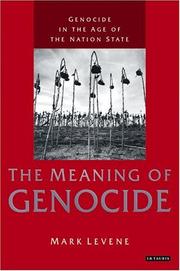
ISBN: 9781850437529 1850437521 9781845110874 1845110579 1845111958 Year: 2005 Publisher: London ; New York : New York : I.B. Tauris ; Distributed in the U.S. and Canada by Palgrave Macmillan,
Abstract | Keywords | Export | Availability | Bookmark
Book
Abstract | Keywords | Export | Availability | Bookmark
 Loading...
Loading...Choose an application
- Reference Manager
- EndNote
- RefWorks (Direct export to RefWorks)
Nation-state --- Korea --- Kings and rulers. --- Politics and government.
| Listing 1 - 10 of 93 | << page >> |
Sort by
|

 Search
Search Feedback
Feedback About UniCat
About UniCat  Help
Help News
News